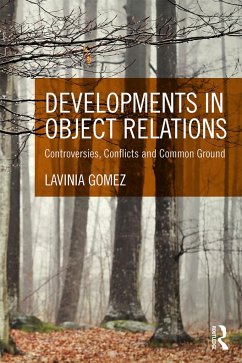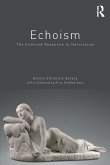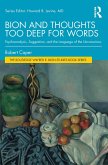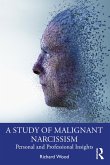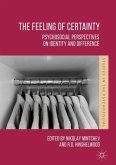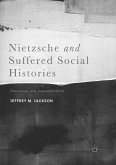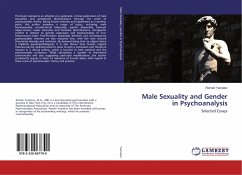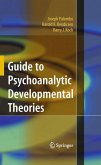Developments in Object Relations provides a highly accessible account of how British Object Relations developed in the second half of the twentieth century, focusing on the generation who took up where Klein and Winnicott left off. Complementing and building on its predecessor, An Introduction to Object Relations, it gives an overview of the development of Object Relations with special reference to the Independent and Kleinian traditions.
An introductory chapter defines the key features of Object Relations. The emergence of Object Relations is is then described theoretically from some of Freud's papers and clinically from the controversial work of Sandor Ferenczi. Similarities and divergences between Kleinian and Independent approaches are considered in detail through the close examination of the work of a key practitioner from each approach, and other significant contributions. Gomez brings clarity to a complex field, discussing what is powerful and problematic about the two main strands in British psychoanalysis. Kleinian and Independent approaches are consistently compared and contrasted, so that readers can develop a clear idea of each. Rather than preferring one to the other, they are presented as different approaches to what is fundamental in psychoanalysis. Chapters on Bion and Masud Khan bring the work of each tradition to life in a fascinating and informative way. Gomez concludes by summarising the claim of psychoanalysis to offer a new way of understanding human reality, particularly useful for readers interested in her second book, The Freud Wars.
Developments in Object Relations will be of great help to psychoanalysts and psychotherapists who work psychoanalytically, particularly those in the process of training, those who have recently qualified and those who are rethinking their position on the different, strongly-held views they encounter. This book is particularly timely when psychoanalytic approaches areunder attack from treatments claiming to offer quicker and easier solutions.
An introductory chapter defines the key features of Object Relations. The emergence of Object Relations is is then described theoretically from some of Freud's papers and clinically from the controversial work of Sandor Ferenczi. Similarities and divergences between Kleinian and Independent approaches are considered in detail through the close examination of the work of a key practitioner from each approach, and other significant contributions. Gomez brings clarity to a complex field, discussing what is powerful and problematic about the two main strands in British psychoanalysis. Kleinian and Independent approaches are consistently compared and contrasted, so that readers can develop a clear idea of each. Rather than preferring one to the other, they are presented as different approaches to what is fundamental in psychoanalysis. Chapters on Bion and Masud Khan bring the work of each tradition to life in a fascinating and informative way. Gomez concludes by summarising the claim of psychoanalysis to offer a new way of understanding human reality, particularly useful for readers interested in her second book, The Freud Wars.
Developments in Object Relations will be of great help to psychoanalysts and psychotherapists who work psychoanalytically, particularly those in the process of training, those who have recently qualified and those who are rethinking their position on the different, strongly-held views they encounter. This book is particularly timely when psychoanalytic approaches areunder attack from treatments claiming to offer quicker and easier solutions.
"Like her previous Introduction to Object Relations, Lavinia Gomez's new book offers excellent guidance for anyone who seeks to get a handle on this important aspect of the British psychoanalytic tradition. In focussing on a select few contributors whose ideas are presented and discussed with great lucidity, Gomez manages to give a most useful account of the development of Object Relations theory and practice. The subtlety and complexity of her writing - as it is perhaps best exemplified by her re-assessment of 'the case' of Masud Khan - makes this book a pleasure to read."-Werner Prall, Ph.D, Senior Lecturer, Centre for Psychoanalysis, Middlesex University and The Guild of Psychotherapists, London.
"Lavinia Gomez describes developments in psychoanalytic thought and technique in Post War Britain. Linking the intellectual and personal biographies of central figures in the Kleinian and Independent groups, she shows how the commonalities and differences within schools of thought converge into a rich body of contemporary psychoanalytic practice. Her accomplished synthesis is interesting, accessible and erudite."-Gabrielle Brown, Adult Psychotherapist, Portman Clinic, Tavistock and Portman NHS Trust, London.
"This book is a stimulating read with both informative and thought provoking content. In a clear, concise style, Gomez describes and comments on the historical emergence of object relations theory and the contrasting approaches that developed from it. Controversial differences are depicted between Klein/Winnicott /Bion/and Khan in an impressive overview and she creatively explores several further developments. Fascinating details about the analysts' lives, set against the backcloth of the psychoanalytic world, connect the reader with the personalities behind the theories."-Anna Bravesmith, (BPC, BAPPS), practising Jungian analyst, trainer and supervisor, member of the Society of Analytical Psychology.
"What first struck me about this book was the author's love for psychoanalysis. Gomez engages deeply and methodically with her subject, offering an original slant as well a valuable overview of Object Relations in the later twentieth century. Linking theoretical and personal aspects of practitioners and their work, together with absorbing case material, means the book will be helpful to experienced clinicians as well as those newer to the field. It is a good resource for all therapists to have in their library, and a must for those involved in teaching. The book is clearly structured, well thought through and highly readable."-Margot Schiemann, MA, Psychotherapist, Supervisor and Teacher, Training Group Analyst with the Institute of Group Analysis.
"Lavinia Gomez describes developments in psychoanalytic thought and technique in Post War Britain. Linking the intellectual and personal biographies of central figures in the Kleinian and Independent groups, she shows how the commonalities and differences within schools of thought converge into a rich body of contemporary psychoanalytic practice. Her accomplished synthesis is interesting, accessible and erudite."-Gabrielle Brown, Adult Psychotherapist, Portman Clinic, Tavistock and Portman NHS Trust, London.
"This book is a stimulating read with both informative and thought provoking content. In a clear, concise style, Gomez describes and comments on the historical emergence of object relations theory and the contrasting approaches that developed from it. Controversial differences are depicted between Klein/Winnicott /Bion/and Khan in an impressive overview and she creatively explores several further developments. Fascinating details about the analysts' lives, set against the backcloth of the psychoanalytic world, connect the reader with the personalities behind the theories."-Anna Bravesmith, (BPC, BAPPS), practising Jungian analyst, trainer and supervisor, member of the Society of Analytical Psychology.
"What first struck me about this book was the author's love for psychoanalysis. Gomez engages deeply and methodically with her subject, offering an original slant as well a valuable overview of Object Relations in the later twentieth century. Linking theoretical and personal aspects of practitioners and their work, together with absorbing case material, means the book will be helpful to experienced clinicians as well as those newer to the field. It is a good resource for all therapists to have in their library, and a must for those involved in teaching. The book is clearly structured, well thought through and highly readable."-Margot Schiemann, MA, Psychotherapist, Supervisor and Teacher, Training Group Analyst with the Institute of Group Analysis.

